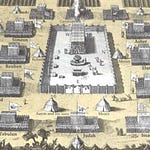I. Numbers Chapter 2: The Encampment of Israel
The passage details the organization of the Israelite camp around the Tabernacle, with each tribe pitching by its standard and father's house.
Judah was on the east side, likely the strongest tribe.
Tribes like Issachar, Zebulun, Reuben, Gad, Ephraim, Manasseh, Dan, Asher, and Benjamin are mentioned with their large numbers (e.g., 46,000, 70,000, 40,005).
These tribal names and their associated stones on the high priest's breastplate carry symbolic meanings for those who wish to study them in depth.
Only males over 20 years old were counted for the census.
The Levites were unique; they were not numbered among the other tribes and were encamped in the very center, surrounding the Tabernacle, indicating their spiritual role and not being part of the army.
The exact and orderly arrangement of the camp (e.g., "every man in his place by their standards" ) highlights God as a God of order, not chaos, necessary for safety and the divine presence.
The concept of "tribe" is discussed as God's original design for families and lineages. The large numbers of people per tribe suggest exponential family growth, possibly involving mixed marriages with Egyptians or "strangers in the camp".
This structure also marked the beginning of an army for protection against inhabitants of the wilderness. The protection ultimately came from God, with the army serving to protect the Tabernacle and the dwelling of God's presence.
II. Connection to the Triennial Cycle & New Testament
The triennial cycle connects the Torah, Psalms, and Prophets, providing Old Testament context for understanding New Testament writings, especially Paul's letters and the Gospels.
Numbers is seen as a complimentary study to the Book of Hebrews.
The Israelites had been in the wilderness for about a year since leaving Egypt and receiving the law (Leviticus). The remaining 39 years of wandering would be covered in the rest of Numbers.
The "wilderness" refers to an unknown, potentially inhabited place, not necessarily a desert.
III. Psalm 90: A Prayer of Moses
Psalm 90 is a prayer of Moses.
It emphasizes God's eternal nature: "from everlasting to everlasting thou art God".
It reflects on the brevity of human life and the impact of God's anger due to iniquity.
"Teach us to number our days" means to live meaningfully, taking account of each day as an opportunity to see God move, rest, repent, and serve.
We should "Seek ye first the kingdom of God" always, not just our own or other worldly kingdoms.
The Psalm asks God to satisfy with mercy, make them glad despite affliction, and establish the work of their hands.
IV. Correlation: Israel in the Wilderness vs. Jesus' Temptation
The 40 years of Israel in the wilderness are directly correlated with Jesus' 40 days of temptation in the wilderness.
The Israelites failed their tests of idolatry, sex, hunger, jealousy, fear, and murder.
Jesus, "led by the spirit into the wilderness" after being recognized as the Son of God, was tested in all things but did not succumb. He relied on God for sustenance, not the world's offerings.
The wilderness experience aimed to rid the Israelites of their "Egyptian mindset".
V. Psalm 91: God as Refuge and Protection
This Psalm continues the theme of God as a dwelling place and refuge.
It promises deliverance from snares, pestilence, terror, and destruction.
God will give His angels charge to protect His beloved.
"Long life" in this context (Hebrew "yomi") refers to a "day" or "division of time," emphasizing the importance of each day.
VI. Isaiah 55 & 56: Everlasting Name and Inclusivity
Isaiah 55:13 speaks of transformation from a "thorn" to a "fir tree" and a "brier" to a "myrtle tree," for an "everlasting sign that shall not be cut off".
Isaiah 56 emphasizes God's inclusiveness: eunuchs (who could not have children or lineage) and "strangers" (non-Israelites) who keep God's Sabbaths and covenant will receive "an everlasting name that shall not be cut off" and be brought to His holy mountain.
God's "house shall be called a house of prayer for all people".
This signifies being "chosen because we do not qualify" and being given God's name, like an adopted child or a bride taking a new name, representing new coverage and identity.
VII. Matthew 21: 28-32 The Parable of the Two Sons
Jesus tells a parable of two sons: one says he won't work in the vineyard but does, the other says he will work but doesn't.
Jesus states that "publicans and harlots go into the kingdom of God before you" (referring to the religious leaders who did not believe John the Baptist), because they repented and believed.
This highlights that "the work is to believe" and live out that belief, bearing spiritual fruit.
VIII. The Devil's Temptation and Wisdom
In Matthew 4, the devil tempts Jesus in the wilderness, quoting Psalm 91:11-12, telling Him to throw Himself down from the temple.
The devil
omitted "to keep thee in all thy ways" from Psalm 91:11, changing the meaning.
Jesus' response is "Thou shalt not tempt the Lord your God".
Tempting God means trying to prove belief or doing something to force God's hand. It's about not waiting on God or trusting His timing, as seen in the disciples' disappointment at the crucifixion.
Proverbs 3:5-6 advises: "Trust in the Lord with all thine heart; and lean not unto thine own understanding. In all thy ways acknowledge him, and he shall direct thy paths". This aligns with "in all thy ways" being crucial.
True wisdom is a gift from God, allowing discernment and understanding, not just accumulation of "stuff".
Avoiding suffering in life leads to anxiety, depression, and illness, as believers cannot truly avoid it. Living in God means "abiding" in Him, not just seeking Him as a temporary refuge in trouble.
Christ did not come to judge the world, as it has already been judged.
Sources











Share this post